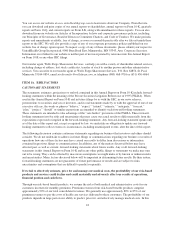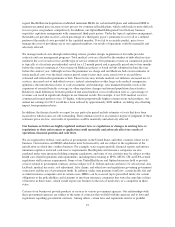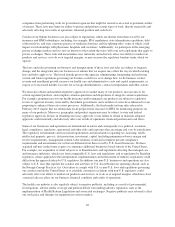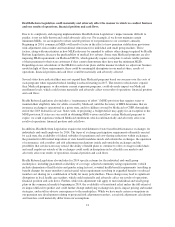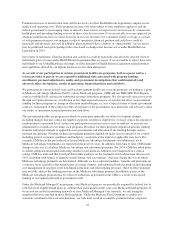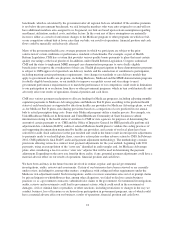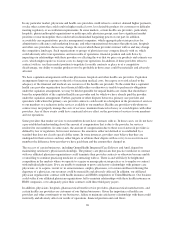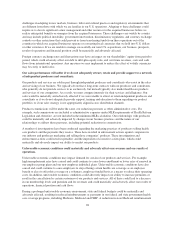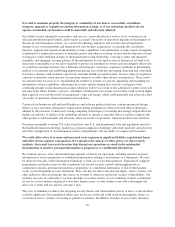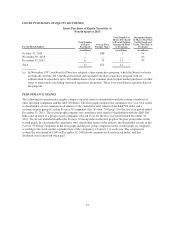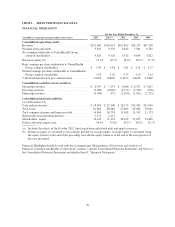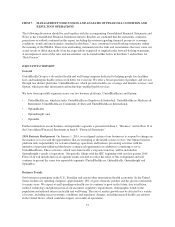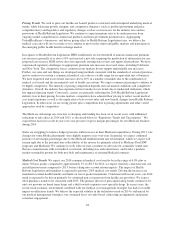United Healthcare 2013 Annual Report Download - page 30
Download and view the complete annual report
Please find page 30 of the 2013 United Healthcare annual report below. You can navigate through the pages in the report by either clicking on the pages listed below, or by using the keyword search tool below to find specific information within the annual report.challenges in adapting to new markets, business, labor and cultural practices and regulatory environments that
are different from those with which we are familiar in our U.S. operations. Adapting to these challenges could
require us to devote significant senior management and other resources to the acquired businesses before we
realize anticipated benefits or synergies from the acquired businesses. These challenges vary widely by country
and may include political instability, government intervention, discriminatory regulation, and currency exchange
controls or other restrictions that could prevent us from transferring funds from these operations out of the
countries in which our acquired businesses operate or converting local currencies that we hold into U.S. dollars
or other currencies. If we are unable to manage successfully our non-U.S. acquisitions, our business, prospects,
results of operations and financial position could be materially and adversely affected.
Foreign currency exchange rates and fluctuations may have an impact on our shareholders’ equity from period to
period, which could adversely affect our debt to debt-plus-equity ratio, and our future revenues, costs and cash
flows from international operations. Any measures we may implement to reduce the effect of volatile currencies
may be costly or ineffective.
Our sales performance will suffer if we do not adequately attract, retain and provide support to a network
of independent producers and consultants.
Our products and services are sold in part through independent producers and consultants who assist in the sales
and servicing of our business. We typically do not have long-term contracts with our producers and consultants,
who generally do not provide services to us exclusively, but instead typically also market health care products
and services of our competitors. As a result, we must compete intensely for their services and allegiance. Our
sales would be materially and adversely affected if we were unable to attract or retain independent producers and
consultants or if we do not adequately provide support, training and education to them regarding our product
portfolio, or if our sales strategy is not appropriately aligned across distribution channels.
Producer commissions will be under the same cost reduction pressures as other administrative costs. For
example, such commissions are included as administrative expenses under MLR requirements of Health Reform
Legislation and, therefore, are not included in the minimum MLR calculation. Our relationships with producers
could be materially and adversely impacted by changes in our business practices and the nature of our
relationships to address these pressures, including potential reductions in commissions.
A number of investigations have been conducted regarding the marketing practices of producers selling health
care products and the payments they receive. These have resulted in enforcement actions against companies in
our industry and producers marketing and selling those companies’ products. These investigations and
enforcement actions could result in penalties and the imposition of corrective action plans, which could
materially and adversely impact our ability to market our products.
Unfavorable economic conditions could materially and adversely affect our revenues and our results of
operations.
Unfavorable economic conditions may impact demand for certain of our products and services. For example,
high unemployment rates have caused and could continue to cause lower enrollment or lower rates of renewal in
our employer group plans and our non-employer individual plans. Unfavorable economic conditions have also
caused and could continue to cause employers to stop offering certain health care coverage as an employee
benefit or elect to offer this coverage on a voluntary, employee-funded basis as a means to reduce their operating
costs. In addition, unfavorable economic conditions could adversely impact our ability to increase premiums or
result in the cancellation by certain customers of our products and services. All of these could lead to a decrease
in our membership levels and premium and fee revenues and could materially and adversely affect our results of
operations, financial position and cash flows.
During a prolonged unfavorable economic environment, state and federal budgets could be materially and
adversely affected, resulting in reduced reimbursements or payments in our federal and state government health
care coverage programs, including Medicare, Medicaid and CHIP. A reduction in state Medicaid reimbursement
28


